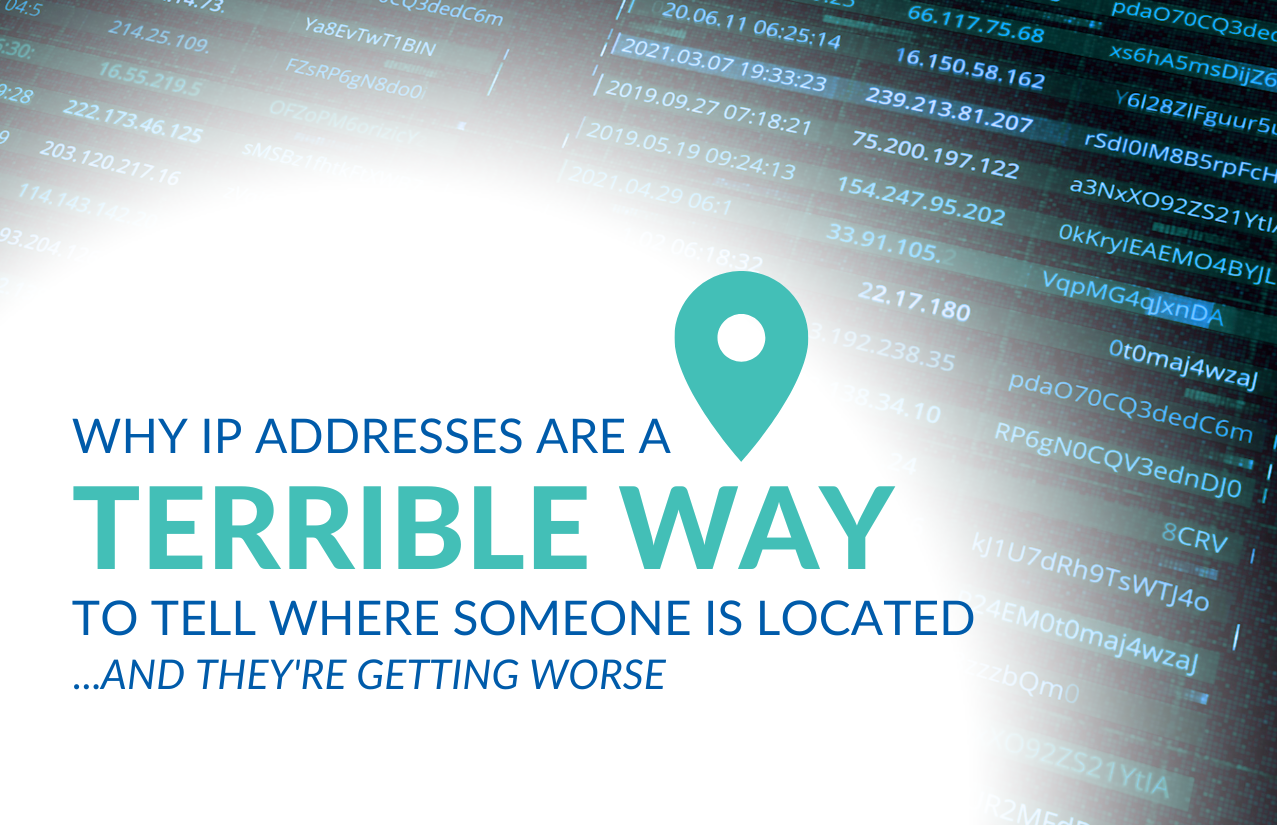Greetings from Alkmaar, a beautiful city in the Netherlands! At least that’s where my IP address says I am. I’m really working from my home office in Washington, D.C.

Not Washington, D.C.
My web browser is hiding my real location, which only required me to click two buttons. I use an alternate location at work for testing our websites to be sure that I’m seeing the same thing as our readers.
People don’t even need to click two buttons to change their IP. If I weren’t hiding my identity intentionally, my use of a corporate VPN would render my IP address location unreliable anyway. I work from home full time, and my VPN routes my internet connection through Cisco’s servers.
IP address locations are becoming more and more arbitrary, even for people who don’t have corporate VPNs. For example, Apple’s new Private Relay feature conceals the IP addresses of iPhone, iPad, and Mac OS users. Here’s how Apple describes it:
“When Private Relay is enabled, your requests are sent through two separate, secure internet relays. Your IP address is visible to your network provider and to the first relay, which is operated by Apple. Your DNS records are encrypted, so neither party can see the address of the website you’re trying to visit.
The second relay, which is operated by a third-party content provider, generates a temporary IP address, decrypts the name of the website you requested and connects you to the site. All of this is done using the latest internet standards to maintain a high-performance browsing experience while protecting your privacy.”
Users of Private Relay can choose to make their IP address appear to come from their choice of country. As a result, an increasing number of iPhone users have IP addresses with locations that are far from where they are scrolling through their phones.
What about email users? Most of BulletinHealthcare’s ads appear in our email news briefings, so how reliable is IP address location in that setting? In a word: bad. Even if a user does not use Private Relay, a corporate VPN, or other measures, IP addresses in email are unreliable.
I’ve been receiving our daily politics newsletter since 2008. I read it almost every day from my personal Gmail account. I see that I opened this morning’s briefing from the IP address 66.102.8.25, which is located in Columbia, South Carolina.

Again, not Washington DC.
I opened the briefing from my Android phone, which doesn’t use a VPN or any other tomfoolery. So why does my IP address suggest I’m eight hours away? Let’s run a WHOIS on that IP.

Google? My phone service and home internet connection are provided by Verizon. Why does Google own my IP address?
There’s an easy answer here. In 2013, Google started opening all images for Gmail users on its servers when a user opens an email. The server then forwards the image to the end user. Gmail announced the feature in a blog post at the time, hailing it as a way of promoting user privacy. Google uses a special user agent and a specific range of IP addresses to make it obvious when someone is using its proxy. Despite these clear signals and having had nine years to adjust, IP geolocation vendors still assume that every Gmail user is physically located in a Google data center.

With more than one billion Gmail users, it must get crowded in there.
Other email providers use similar systems, cloaking the actual IP addresses where opens take place.
Taken together, these technologies have rendered IP addresses functionally useless in determining where an email recipient is physically located. Physicians using VPNs, Apple Private Relay, Gmail, or any of several other systems will present IP addresses that have no relationship to their physical location.
What to do?
Knowing the location of people who see an advertisement is important, both for legal compliance and for ad targeting. So, what’s an advertiser to do? The key is focusing on people instead of impressions. An ad impression in isolation lacks context. Knowing exactly who is receiving an ad, why she is receiving it, and where she lives is far more useful. Any system that provides accurate targeting at an individual level and that includes up-to-date location information will be better than relying on the outdated one-size-fits-all logic of IP geolocation. At BulletinHealthcare, we’ve spent years building a patented publishing and ad serving system that presents a full picture of each recipient of an email briefing.
Interested in learning more about our ad platform and capabilities? Reach out to advertise@bulletinheathcare.com.

Director, Advanced Analytics




